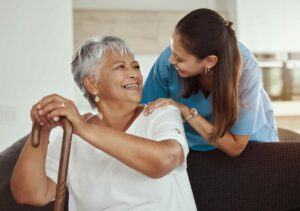Independence does not diminish with age. Infact, it becomes more important and is top of mind as we move into our senior years. Over 3.8 million Australians aged over 65 face the challenge of maintaining independence as they age.
As a family carer, one of your biggest goals is to encourage your loved ones to continue living an active and independent lifestyle. Taking an active part in supporting them is crucial to the success of this endeavour. So, let’s explore why independence in older age is so important and what role you can play to support that autonomy.
What does independence mean to older Australians?
Most of us spend our adulthood living independently, making decisions, working, raising families, pursuing leisure activities, and managing countless responsibilities. However, the challenges posed by the ageing process can challenge this existence, especially when the scope of our independence is diminished because of changing mobility or health, necessitating the need for assistance to perform daily tasks.
Being independent is crucial in generating a sense of self-worth and well-being as an adult. The ebb and flow of life brings corresponding change and uncertainty. Therefore, independence is sometimes the only thing older adults may feel they can control as certain aspects of their life change with age.
In addition, maintaining independence promotes a sense of achievement for many seniors through continued autonomy, which is empowering and makes life more worthwhile and enjoyable. Independence, therefore, may provide a rock to which a person ageing in place may anchor.
The Negative Impacts of Diminished Independence
The level of independence can significantly affect the physical and emotional health of ageing Australians. Overall health may be negatively affected by losing the ability to live independently due to frailty, reduced mobility, disability, or a pre-existing or recent onset of a chronic physical condition.
The loss of independence can be isolating. Seniors who are isolated can develop feelings of hopelessness and depression, and the adverse effects on their mental health can lower their quality of life. Although it is a serious condition at any age, depression is particularly complex in older people, with a loss of independence often leading to greater self-neglect.
How Can Family Carer Best Support Older Loved Ones?
Research suggests the vast majority of Australians want to age in place within familiar communities, thus minimising dependence on others and avoiding institutionalisation. While we cannot avoid some barriers to independence, we can take the time to look for ways to increase opportunities for independent living.
Here are five strategies you can implement to promote independence.
⦁ Encourage social interactions and purposeful engagement – older adults generally do not get out of the house as often as they used to, which can sever social ties. Help arrange routine outings and meetups with friends and family.
⦁ Encourage physical activity and exercise – Regular exercise is good for the body and mind and can help delay the onset of Alzheimer’s and dementia, plus improve strength and mobility. Daily walks, exercise classes, and day trips are all great options.
⦁ Improve safety around the house – Ensure all walkways and high-traffic areas are free of trip hazards. Increase lighting to further reduce the risk of falls, particularly at night time. Take advantage of smart lighting options and voice-activated technology. Install support aids such as handrails in bathrooms and showers.
⦁ Arrange for in home care – In-home care services facilitated by a home care agency can significantly lower the burden for the elderly ageing in place and their family carers.
In home Carer Workers can provide various services ranging from bathing, dressing, and cleaning to therapy and nursing services.
⦁ Encourage and support their choices – it is easy to take choices for granted, especially those we make every day – such as the clothes we wear or the food we eat. Empower your loved ones to make their own choices by listening to what they want and always keeping them involved in the decision process.
How can Home Care Assistance Support Independence?
We understand that to maintain true levels of independence, it is essential for seniors to be involved in their own care. Accordingly, older Australians need access to a flexible range of care and support services that meet their specific current needs and, to the extent possible, maintain or restore their independence and wellness.
Home Care Assistance provides personalised and flexible in home care tailored to suit the evolving needs of older individuals and enable independent ageing in place. Our Care Management team and Care Workers support our customers to live a dignified life in the comfort of their own homes by offering support with their day-to-day activities and wellbeing. Home Care Assistance are ready to help.
As a leading age care provider, Home Care Assistance offers tailored in-home care services for older Australians, enabling them to live happier and healthier lives in the comfort of their own homes.
We offer private and government subsidised Care Packages and have office locations that are a registered NDIS provider. Our Care Workers undergo extensive training in order to deliver unmatched in-home aged care services where people can continue ageing in place. We are proud ambassadors of the My Aged Care government funded aged care program, enabling Australians to successfully navigate the process and gain approval for in-home care support packages. Home Care Assistance offers hourly care, specialised care, Alzheimer’s and Dementia care, hospital to home care, and 24 hour in home care.













